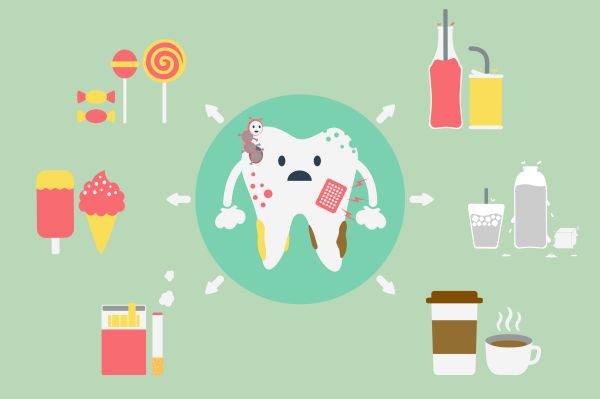5 Oral Hygiene Tips for Kids’ Young Teeth

Teaching your children proper oral hygiene will help them keep their teeth healthy for life. Most habits that stick with us form during childhood, including how to care for our teeth.
Why is oral hygiene important for children?
Most people want a nice smile and white teeth. Proper brushing and flossing can help with this. More importantly, hygiene is essential to have healthy teeth, jaws and gums.
The primary teeth, or baby teeth, help children to talk, smile and eat. They also act as placeholders for the permanent teeth. This means that if they fall out too early, the lost tooth can cause the remaining teeth to shift into undesirable positions. This causes the permanent teeth to come out crooked.
Oral hygiene tips for children's teeth
Here are some oral hygiene tips that you can share with your children:
1. Feed them healthy food
Oral bacteria feed on sugars and refined carbohydrates to produce acids that attack the tooth enamel. The enamel is what stops harmful bacteria from infecting the teeth. Once bacteria gain access to the inner tooth, the bacteria can cause decay.
Indulge your child’s sweet tooth with healthy snacks or juices that come from actual fruit. At mealtimes, swap out refined carbs with complex ones and add other food groups to complete the meal.
2. Brush twice a day
Cleaning the teeth and mouth is the most important and basic part of oral hygiene. Depending on the child’s age, here is how to clean their mouth.
A child that has no teeth still needs their mouth cleaned regularly. After a meal, the parent should clean their baby’s mouth by gently wiping the gums with a wet washcloth. They should continue to clean the gums this way until most of the teeth erupt.
When the first teeth erupt, a parent should start brushing them with a pea-sized amount of fluoride-free toothpaste and a children’s toothbrush. They should continue to wipe down the remaining gums until the rest of the teeth erupt.
Once the child turns 2, let them start brushing their teeth. Supervise them and participate to set an example.
Teach your child to brush in the morning and at night as well as after lunch when possible.
3. Floss at least once a day
Once all their teeth come in, your child can start to floss. Make flossing a fun event to keep the kid interested. Use stories and songs or make a game out of it.
4. Replace toothbrushes often
A toothbrush should be replaced every three months or when the bristles get frayed, whichever comes first. Get your child excited about a new toothbrush and let them choose their favorite rush. Be sure to use a soft toothbrush.
5. Get routine checkups
A child should see a dentist by the time they turn 1 year old. They should continue going for routine checkups every six months after that. These routine dental visits will teach the child not to be afraid of dentists. They also give the dentist a chance to monitor the growth of the child’s teeth and jaws. This will help catch problems in their early stages.
Does your child need to see a dentist?
With a proper oral hygiene routine, your child’s teeth should stay clean and healthy. That said, you still need a dentist to ensure their teeth grow properly and to identify other concerns.
If your child needs to see a dentist, please call our office to learn about our services.
Request an appointment here: https://dentistlindennj.com or call AC Dental of Linden at (908) 862-7171 for an appointment in our Linden office.
Check out what others are saying about our services on Yelp: Read our Yelp reviews.
Recent Posts
Good oral hygiene is more important than ever now because you may not be going to your regular appointments. Under normal circumstances, it is recommended to visit your dentist every six months for cleanings and exams. However, because you may be missing appointments, you should take better care of your teeth than before. Read on…
Dental issues are never any fun. In the case of most common dental issues, signs are easily recognizable and can be easily prevented or cured. Most of us take the essential steps in preventing most dental problems with regular dental check-ups, flossing and brushing. However, issues can happen no matter what we do. There are…
You only get one set of adult teeth, and most older folks will tell you how much those teeth are missed when they are gone.Regular visits to the dentist are an important part of dental care, but what can you do to clean and maintain your teeth on a daily basis?These five easy tips can…
Triclosan is an antibacterial composite in cleaners, soaps, body washes and oral hygiene products of all sorts. While triclosan combats gingivitis, some people argue it might have negative health ramifications. There is some evidence triclosan can alter liver health. Others argue this antibacterial composite might disturb thyroid function.Abrasives help remove stains from the teeth. The…


